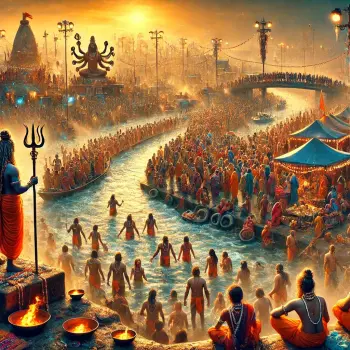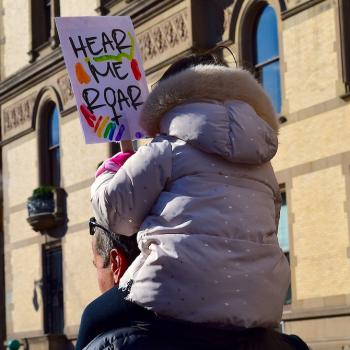Editors' Note: This article is part of the Patheos Public Square on the Spirituality of Sex. Read other perspectives here.
A colleague of mine pastors a congregation that includes a significant percentage of LGBTQ members. It's a vibrant place, particularly in terms of worship and the way new folks are invited and incorporated into the life of the community.
If, after someone's been attending awhile, a member of the leadership team discerns a particular set of gifts in that person, an invitation might be extended: Would you like to join the anti-sodomy ministry?
That's a joke.
I mean, they really do that, but it's funny because they're playing off of a given, and popular, reading of "the sin of Sodom and Gomorrah," which assumes that the sin is about men having sex with other men (or angels). It's one of a handful of texts that are often used to "clobber" Queer Christians, by insisting on the "obvious" prohibition against same gender sexual relationships. But another reading of that story in Genesis 19, one that makes more sense in the context of the story and in the greater biblical narrative (check out Ezekiel 16:49-50), suggests that the sin of Sodom is a lack of hospitality (and, in fact, violent treatment of strangers). So, the anti-sodomy ministry is the hospitality and welcoming committee. They make the coffee.
I wouldn't recommend just any congregation take up this practice in naming its committees, but I mention it because it is one way this church points out, rather cheekily, that there are a number of ways to interpret the Bible and to make sense of its meaning for our lives here in the 21st century, hundreds and hundreds of years after these stories were first recorded. Many Christians are—and have been through the millennia—happy to recognize that the Bible is a multi-layered set of texts and that understanding its content in a number of different ways is not a slight to God or an exercise in postmodern deconstruction. Augustine, Bishop of Hippo (354-430) and Thomas Aquinas (1225-1274) both read the creation narratives of Genesis allegorically, and the Song of Songs has been interpreted in a host of ways by both Jewish and Christian teachers for centuries.
All this goes to say that the Bible is a complicated resource for Christians wanting to think about how their religious commitments and their experience of God should rightly shape their understanding and practice of their sexuality.
There are those, certainly, who would suggest that the Bible is clear on God's will for sexuality—not until heterosexual marriage, thank you very much. As a preacher and pastor who's professionally wrestled with the biblical narrative week in and week out for over a decade, however, I hesitate to say that we should treat this complex and holy record of God's relationship with a community as nothing more than a rule book, with regard to anything, but especially not with regard to our sexuality.
Humanity continues to grow in our understanding of gender and human sexuality, and each generation asks the questions of the meaning of life and love anew. And thus we're called to dig into our tradition and our scriptures, but also to mine our own experiences and learn what the world has to teach us.
So, here's what I've learned:
We are, each and every one of us, created in the image of God. Male, female, intersex, trans, whomever: image of God. There is something holy and wonderful about us in our individual diversity and as a species. Nobody is better than anyone else; nobody's body is better than anyone else's.
We are, each and every one of us, impacted by and influenced by sin; we hurt ourselves and others; far too often we do what is not right, sometimes even when we know better.
There is nothing in all creation that can separate us from the love of God; such is the power of the resurrected Christ. The power of sin is real, but it's broken. God's grace is bigger.
We have bodies! We are incarnate beings. Jesus was God incarnate, God in a body. Despite sometimes conflicting desires of our component parts—my body longs for sleep, my mind races with anxiety—body and soul are not intrinsically opposed. Our bodies, then, are not to be despised.
Human beings are created to be in relationship, in community. No man is an island, and all that. Living together in love, and ordering our relationships and society in just ways, are primary concerns for those who would be faithful to the call of God.
What is the greatest commandment? people are forever asking Jesus. He answers, routinely, Love the Lord your God with all your heart and mind and soul and strength, and your neighbor as yourself. Everything else flows from this.
The world is beautiful and good, and this life is worth living. Death's victory is swallowed up in resurrection. Jesus came that we might have life, and have it abundantly. The purpose of life is more life, not playing by the rules at all costs, out of fear or self-righteousness.




